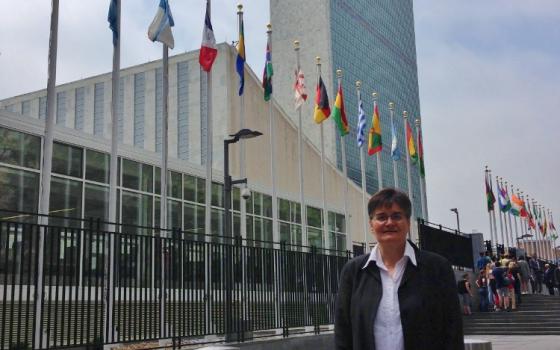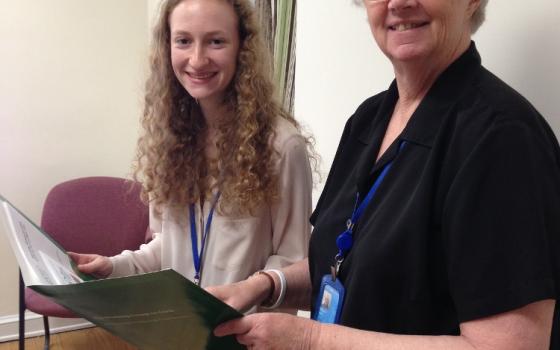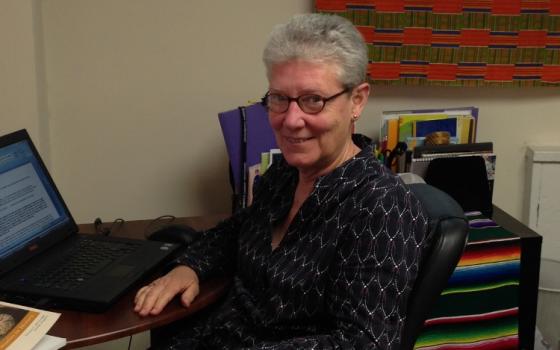It took a radical notion about serving the marginalized to encourage Sr. Eileen Reilly to accept a job at the United Nations.
The position had been suggested to Reilly multiple times, all of which she graciously declined. When her general superior gave a talk on radical availability, being open to God’s call and the working for the needs of all, Reilly explained that “it just went right to my soul. . . . How can I continue to say no when she’s challenging us all . . . to be radically available to the needs?”
The United Nations was founded in 1945 on the pillars of peace and security, human rights, and development. Today, those pillars still guide the work. Yet, as an inter-governmental system of 193 member states, the United Nations is only as strong as its weakest members and only as strong as each member government allows it to be. While the bureaucracy and power plays are frustrating and discouraging, the presence of non-governmental organizations, or NGOs, many of which are operated by religious communities, helps push the focus of debate to people and the planet rather than power, money, and self-interest.
Reilly has worked as the School Sisters of Notre Dame’s representative at the United Nations for five years. She is just one of the impressive people I have met here during my year of service as a Dominican Volunteer working with the Dominican Leadership Conference. Sitting on NGO committees that focus on women and girls’ issues, migration, human trafficking and on peace, security and disarmament, I have had the privilege to work with numerous passionate NGO representatives, many of whom are women religious.
Reilly believes NGOs have credibility drawing connections to people’s needs on the ground because of their worldwide network of social services. This network establishes NGOs as a voice of conscience. An ambassador recently told Reilly that she has the ability to say things at the United Nations that the ambassador cannot. “Ambassadors are often constrained either by their national capitals or by what’s politically correct,” Reilly said, “and this [ambassador] recognized that we don’t have those constraints, so we can speak the truth.”
Dominican Sr. Margaret Mayce has long been involved in issues of peace and justice. After living and working among disenfranchised people in the Dominican Republic, she moved to a U.N. position six years ago, to be the representative for the Dominican Leadership Conference.
“This just seemed like a way in which a lot of threads were brought together for me.” Mayce said. “This is an opportunity for me to deal with the other side of charity, which is justice, and do whatever little bit I’m able to do to bring about the day when the systems will change and people won’t have to live the way they’re living.”
Dominican sisters and brothers worldwide deal with poverty, the plight of women and girls, human trafficking, migration and social development. “Underpinning all of this is human rights,” Mayce said. “We are at the U.N. because we have a long standing history of advocacy on behalf of human rights. . . . Here we do it through the lens of development.”
Over time, Mayce has become more involved with the issues of sustainable development and climate change. “At the end of the day, all the good that we’re trying to do in terms of poverty eradication, migration, trafficking – it’s all undermined if we’re not paying attention to that which sustains all, which is Earth,” Mayce explained.
With so many global issues demanding prompt attention, it is often difficult to see changes being implemented and feel that voices are being heard. However, the presence of Catholic women religious at the United Nations has shown me how instrumental and critical they are to changing structures and systems.
Franciscan Missionary of Mary Sr. Odile Coirier recently moved to New York after working at the United Nations’ office in Geneva. She is originally from a small village in France. The transition to New York City has been exciting and fast-paced, and Coirier sees it as a “wonderful place to meet the world.”
The Universal Declaration of Human Rights and the Charter of the United Nations state that people should be at the center of the concerns, goals and objectives at the United Nations because, Coirier said, in the end, people’s lives are what matter most. Women religious have both the ability and the responsibility to link the U.N. system to those on the ground.
“Governments are there to make decisions on behalf of their people,” she said. “It’s very important to get the input and concerns of the people at the grassroots. As sisters we have this worldwide network. . . . We can easily contact people on the ground everywhere in each country that we are present.”
And while the United Nations can function in traditional and even fossilized ways, Reilly said, women religious have the ability to act with freedom and speak the truth. Because many of them work at the margins of society, they see human struggles and understand societal issues. They can then bring these concerns to the U.N. in an attempt to break that fossilized separation between those on the ground and those holding decision-making power.
Women religious at the United Nations are accountable to their sending organizations, which they report to regularly, therefore they have more latitude and are able to be clear about the message they want to communicate. They also affect the tone of conversation. “It’s a very important place for women religious to be,” Mayce explained. “I do think we have a perspective on life and relationships that [is not common] here. One of my great abiding hopes is that the next secretary-general will be a woman.”
Coirier recognizes the accomplishment of representatives from 193 countries coming together to sit at the same table to work toward development and human rights. Creating this platform that encourages discussion and debate in order to create change is a remarkable feat. Of course, she noted, there is much room for improvement, but she believes the system has great potential and is “a wonderful laboratory of ideas.”
While the processes at the United Nations are often sluggish and frustrating, Coirier keeps in mind the slow evolution of humanity. “When I see myself, it sometimes takes years to become aware of a situation in my own life,” she said. “It’s the same for each progress, each move; it’s a slow process.”
Having Catholic sisters as part of the process is essential to the work toward peace and security, human rights and development. “What I am doing now, it’s important, even though I don’t see the results – it will bear fruit,” Coirier said.
One of the most rewarding aspects of Reilly’s time at the United Nations has been the collaboration among the religious. “I don’t know what I would do if I was here alone,” she said. “I really count on people for support, for insight, for collaboration, for tips. . . . It’s a really important part of the work.”
Twenty years ago, she said, there were only four or five nuns at the United Nations, and they worked independently of one another. Today, there are about 45 religious NGO representatives, according to the group Religious at the U.N.
The NGOs of religious communities may have a bias, Mayce said, but it is a bias that is associated with the planet, the people, and their needs. NGOs are a necessary “thorn in the side of governments reminding them that there’s a dimension to life and to the debate that they need to pay attention to.”
[Kelly Litt is a 2014-2015 Dominican Volunteer serving with the Dominican Leadership Conference NGO to the United Nations in New York City. She graduated summa cum laude from Ohio Dominican University with a degree in history and minor in peace and justice. At the United Nations she works on a variety of global issues including peace and security, women and girls’ issues, migration and human trafficking.]


